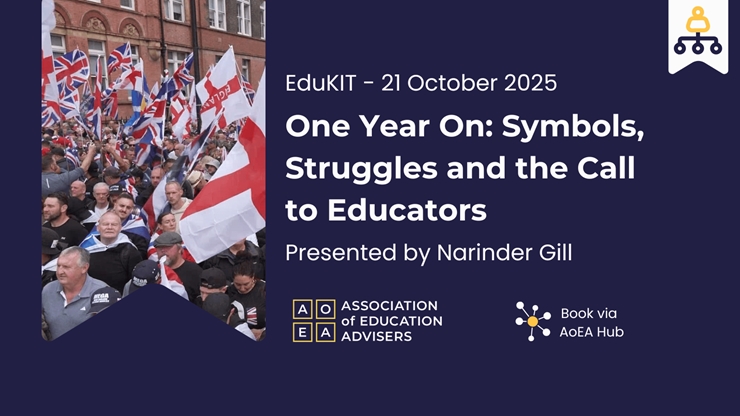
EduKIT: One Year On: Symbols, Struggles and the Call to Educators

EduKIT date: 21 October 2025
One Year On: Symbols, Struggles and the Call to Educators
A year has passed since riots unsettled some of our communities. While the visible unrest has subsided, the deeper fractures remain. Across the UK, flags continue to be raised and marches unfold weekly. For some, these represent pride and identity. For others, they trigger unease and exclusion. As an educator who has witnessed these divisions play out in our classrooms and corridors, Narinder has seen firsthand how these tensions ripple through our young people's lives.
These moments stir complex emotions: pride, belonging, unease, and sometimes fear. They remind us that symbols are never neutral they carry history, meaning, and consequence. As educators and leaders, we cannot afford to stand on the sidelines.
Now is the time to create intentional spaces for professional dialogue where we, as leaders, can gather to ask and answer difficult questions together:
The Questions We Must Ask and Answer
- How do we help young people process complex emotions around identity and belonging when our own communities often feel divided?
- What practical steps can we take to address the deeper inequalities and mistrust that fuel these tensions?
- How do we lead with both compassion and clarity when faced with symbols and narratives that divide our communities?
These are not abstract questions. They require us to examine our curriculum choices, our response to playground tensions, our parent engagement strategies, and our own unconscious biases.
This work demands three core commitments:
Courage: The willingness to have uncomfortable conversations and examine difficult truths about inequality and exclusion in our communities.
Humility: Recognizing that we don't have all the answers and that our young people may teach us as much as we teach them.
Solidarity: Understanding that this cannot be individual work it requires sustained collaboration across schools, communities, and professional networks.
The Invitation
This is an opportunity to engage in a professional dialogue where educators can reflect honestly without judgment on our challenges and responsibilities. Together, looking at practical approaches we can implement in our settings.
Some of us may feel unprepared for this work. Others may question whether it's truly our role. Many of us are already stretched thin. Some of us are exploring or managing successful approaches. Concerns are valid and important and they're precisely why we need to support each other through structured, professional dialogue.
This is not easy work. It requires us to resist the temptation of quick fixes and instead commit to the patient, transformative work of building inclusive and resilient communities. But it also offers hope: the possibility that we can prepare our young people to navigate these realities with empathy, wisdom, and genuine understanding.
The question a year on is not simply how we respond to flags or marches. The real question is: how do we equip our young people to build the cohesive, just communities we all want to see?
That answer begins with us and with the conversations we choose to have now.
Narinder Gill is a seasoned educational leader, executive coach, and author with extensive experience in transforming schools and curriculum systems. She has led some of England’s most challenging primary schools, embedding compassionate, inclusive, and evidence-based approaches to teaching and learning. Currently, she serves as a DfE RISE Adviser, supporting schools and leaders to achieve sustainable improvement and excellence. As a founder of CS Reboot and the AI in Education group, she drives initiatives that make computer science and AI education accessible and inspiring for children from all backgrounds. Narinder advises schools and educational trusts on strategic improvement, accountability, and leadership development, helping leaders translate vision into sustainable impact. Committed to equity, integrity, and purpose-driven change, Narinder champions initiatives that empower both educators and learners to thrive.






